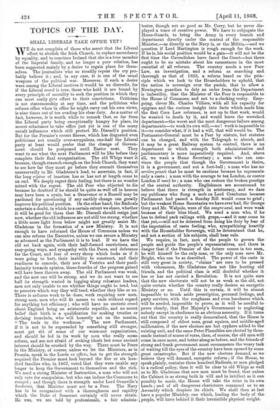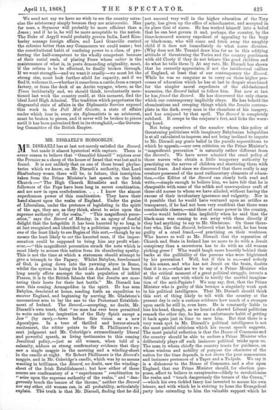TOPICS OF THE DAY.
SHALL LIBERALS TAKE OFFICE YET WE do not complain of those who assert that the Liberal effort to abolish the Irish Church, to replace ascendancy by equality, and to convince Ireland that she is a true member of the Imperial family, and no longer a poor relation, has been suggested mainly by a desire to regain place for them- selves. The journalists who so steadily repeat the cry pro- bably believe it ; and, in any case, it is one of the usual weapons of the political war. Moreover, if such a desire were among the Liberal motives it would be no discredit, for if the Liberal creed is true, those who hold it are bound by every principle of morality to seek the position in which they can most easily give effect to their convictions. Criticism is not statesmanship at any time, and the politician who refuses office when in office he might carry out his own views, is nine times out of ten evading his clear duty. As a matter of fact, however, it is worth while to remark that, so far from the Liberal party being exceptionally hungry for place, its secret reluctance to take office just yet is one of the many occult influences which still protect Mr. Disraeli's position. But for the Premier's recent finesse, which has disgusted even politicians not usually over-scrupulous, one-half the Liberal party at least would prefer that the change of Govern- ment should be postponed until Easter next. They want to see what the next Parliament will be like before they complete their final reorganization. The old Whigs want it because, though staunch enough on the Irish Church, they want to see how far they must go before they commit themselves unreservedly to Mr. Gladstone's lead, to ascertain, in fact, if the long regime of inaction has or has not at length come to an end. We deeply regret their feeling, but there is no wonder mixed with the regret. The old Peer who objected to die because he doubted if he should be quite as well off in heaven may have been a cynic, but a Grosvenor or a Russell may be pardoned for questioning if any earthly change can greatly improve his political position. On the other hand, the Radicals entertain a doubt, in which to a certain extent we share, whether it will be good for them that Mr. Disraeli should resign just now, whether the old influences are not still too strong, whether a little more light from below might not greatly assist Mr. Gladstone in the formation of a new Ministry. It is not enough to have reformed the House of Commons unless we can also reform the Executive, unless we can secure a Ministry as advanced as the Parliament it is to lead. If we have the old set back again, with their half-formed convictions, and easy-going ways, and sympathy with the Peers, and deference for the Court, and fear of every sheep which looks as if it were going to butt, their inability to construct, and their readiness to concede, their awe of Vestries and their pusil- lanimity towards opinion, three-fourths of the progress gained will have been thrown away. The old Parliament was weak, and the new one will be strong, and we do not want to see half its strength wasted in lugging along reluctant leaders, men not only unable to see whither things ought to tend, but to perceive which way they will tend, whether they like or no. There is arduous work to be done, work requiring new men, strong men, men who will fit means to ends without regard for anything but efficiency ; who will have no esoteric creed about England being an aristocratic republic, and no secret belief that birth is a qualification for making treaties or devising ironclads, who will honestly act on the maxim, " The tools to the workman." The new Parliament, if it is not to be superseded by something still stronger, must get rid of some of our worn-out organizations, and should be led in its work by men who really mean reform, and are not afraid of seeking ideals lest some ancient interest should be crushed by the way. There must be Peers in the Ministry, of course, unless we let the Ministers, as in Prussia, speak in the Lords ex officio, but to get the strength required the Premier must look beyond the five or six hun- dred families who, in 1867, voted that they were unable any longer to keep the Government to themselves and the rich. We need a strong Minister of Instruction, a man who will not only vote for compulsion, but who can induce the Commons to compel ; and though there is strength under Lord Granville's bonhomie, that Minister must not be a Peer. The Navy has to be reorganized with a thoroughness and rapidity which the Duke of Somerset certainly will never attain. He was, we are told by professionals, a fair adminis- trator, though not so good as Mr. Corry, but he never dis- played a trace of creative power. We have to subjugate the Horse-Guards, to bring the Army in every branch and department directly under the control of the responsible Minister,—as directly as the Navy is, or the Militia,—and we question if Lord Hartington is rough enough for the work. If he is, his social position would be a gain—it will not be the first time the Cavendishes have faced the Court—but there ought to be no mistake about his earnestness in the most essential of all reforms. The country needs a new Poor Law, an investigation, and a reform as searching and thorough as that of 1833, a reform based on the prin- ciple which we look to the Householders to uphold, that. the nation is sovereign over the parish, that to allow a. Newington guardian to defy an order from the Department is imbecility, that the Minister of the Poor is responsible to- the House of Commons, and not to a clacking vestry. Easy- going, clever Mr. Charles Villiers, with all his capacity for- epigram and the curious insight into facts which made him_ the first Corn Law reformer, is not up to that work, would be wearied to death by it, and would leave the wretched_ department—the worst and the most dangerous failure among, departments—to work its own will,—no work is impossible to. it—to consider what, if it had a will, that will would be. The Postmaster-General must be a Peer by statute, but statutes can be changed, and with the Telegraph to absorb, and. it may be a great Railway system to control, there is no department in which strength both administrative and parliamentary is more imperatively required. And, above all, we want a Home Secretary ; a man who can con- vince the people that though the Government is theirs,. it is a government, and not a foot-ball ; a man who has no arribv pense'e that he must be cautious because he represents. only a caste ; a man with the courage to tax London, or coerce London if need be ; a man who can restore the broken prestige of the central authority. Englishmen are accustomed to that there is strength in aristocracy, and we dare say publicans who flung a mob on Lord Cranborne because Parliament had passed a Sunday Bill would come to grief ; but the weakest Home Secretaries we have ever had, Sir George- Grey and Mr. Walpole, were of the sangreazul, and were weak because of their blue blood. We need a man who, if he- has to defend park railings with grape,—and it may come to that yet,—will not be deterred from doing his duty by fear of the imputation of caste feeling, who, sympathizing heartily with the Householder Sovereign, will be determined that he and not a section of his subjects, shall bear rule.
We require, in fact, men of the people to govern the. people and guide the people's representatives, and there is. danger that if the Premier of the future comes in too soon,. he will himself be the only man, or the only man save Mr.. Bright, who can be so described. The power of the caste is still very great in society, " claims " are sure to be pressed with vehemence, Mr. Gladstone does not like hurting old friends, and the political class is still doubtful whether it has or has not carried a Revolution. It is not quite sure that the new electorate will not be as weak as the old, not• quite certain whether the country really desires an energetic. Ministry or no. Until this is certain, it will be almost impossible to brush aside prescription, personal feelings, and party services, with the roughness and even harshness which._ will be needed, impossible to prove, as it will be needful to. prove clearly, that Her Majesty's Government is neglecting nobody except in obedience to an obvious necessity. If it turns out that the country is really demoralized, that the House is still composed of eldest sons, great squires, and middle-aged' millionaires, if the new electors are but cyphers added to the- existing unit, and the same Peter Plausibles are elected by thou- sands instead of scores of votes, then, of course, the old men will come in once more, and totter along as before, and the friends of strong and frank government must recommence the weary task of waiting till the eyes of the country have been opened by some great catastrophe. But if the new electors demand, as we- believe they will demand, energetic reform ; if the House, to speak plainly, contains three hundred Radicals, or men pledged to a radical policy, then it will be clear to old Whigs as well as to Mr. Gladstone that new men must be found, that unless the Cabinet is as strong both in will and in intellect as it can possibly be made, the House will take the reins in its own/ hands ; and of all dangerous charioteers commend us to an Assembly which despises its chiefs. We shall then at last have a popular Ministry, one which, leading the body of the people, will have behind it their irresistible physical weight. We need not say we have no wish to see the country ostra- cize the aristocracy simply because they are aristocratic. Man for man, a Seymour will probably be more efficient than a Jones ; and if he is, he will be more acceptable to the nation. The Duke of .Argyll would probably govern India, Lord Kim- berley manage foreign affairs, and Lord Granville control the colonies better than any Commoners we could name ; but the constitutional habit of confining power to a class, of pre- ferring the half-competent to the wholly competent because of their social rank, of placing Peers whose métier is the maintenance of what is, in posts demanding originality, must, if the reform is to be effectual, be finally broken through. If we want strength—and we want it cruelly—we must let the strong rise, must look further afield for capacity, and if we find it, welcome it, —whether it come from a castle, from a carpet factory, or from the deck of an Arctic voyager, where, as the Times incidentally and, we should think, involuntarily men- tioned last week the country could, at this moment, find the ideal Lord High Admiral. The tradition which perpetuates the disgraceful state of affairs in the Diplomatic Service exposed this week in the Pall Mall Gazette, a state of affairs under which four in every six diplomatists is an aristocrat, must be broken to pieces, and it never will be broken to pieces until it has been pulverized first in its stronghold,—the Govern- ing Committee of the British Empire.



































 Previous page
Previous page